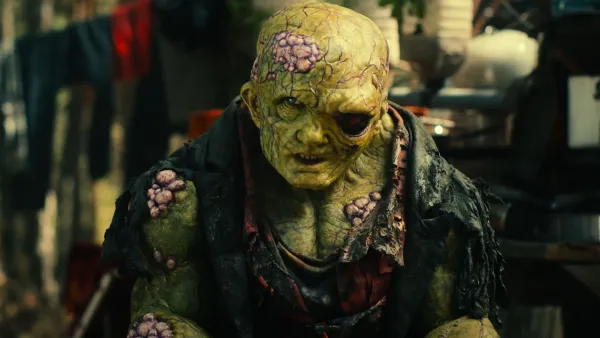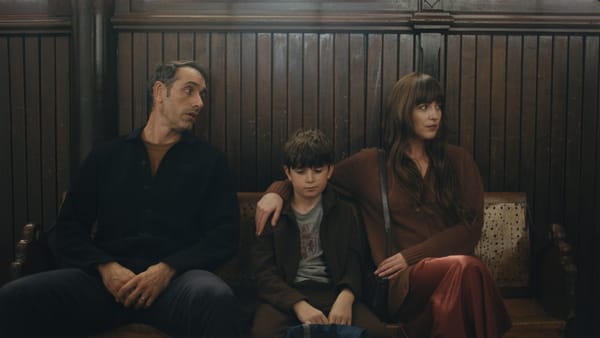Amy Adams’ 'Nightbitch:' An Ambitious Premise That Doesn’t Quite Deliver

I’ll watch almost anything starring Amy Adams. She’s not just one of the most talented actors of her generation—she’s also someone who consistently takes on challenging, left-of-center roles.
For every mainstream blockbuster like Enchanted or Man of Steel, there’s an Arrival, a Nocturnal Animals. She’s at a point in her career where she’s not just starring in films but producing them—using her clout to shepherd unconventional projects to the screen. That’s a powerful thing, and it’s part of why her new film, Nightbitch, exists.
Directed by Marielle Heller and based on Rachel Yoder’s 2020 novel, Nightbitch is precisely the kind of ambitious, offbeat project Adams has become known for championing. It’s an allegorical tale about the physical, emotional, and societal toll of motherhood, told with a bite of magical realism. But while the film, now streaming on Hulu, raises some fascinating ideas and themes, it struggles to maintain momentum and ultimately feels like a tonal and narrative misfire.

The story follows a nameless protagonist, played by Adams, a former artist turned stay-at-home mom grappling with the isolating and life-altering realities of early motherhood. Her days are consumed by exhaustion, monotony, and the impossible expectations placed on new mothers. Her husband (Scoot McNairy), a well-meaning but largely absent father, is often away on business, leaving her alone to manage their young son and her own unraveling mental state.
Oh, and she might be turning into a dog.
Yes, a literal dog. At night, she begins to exhibit canine behaviors—first pulling a tail from a pus-filled bump on her back, then prowling the neighborhood in full canine form and consuming heaps of meat from a bowl—before eventually killing the family cat.
As the film leans into this surreal transformation, it’s unclear whether it’s a metaphor for her postpartum experience or an actual physical phenomenon. The ambiguity is clearly intentional, but it often feels frustrating rather than thought-provoking.

Nightbitch deserves credit for fearlessly diving into the harsh realities of motherhood—the loss of identity, the overwhelming societal pressures, and the physical and mental toll of postpartum life. In its opening moments, Adams delivers a monologue about the crushing weight of familial and societal expectation that is unflinchingly honest and resonant. The film attempts to capture the feeling of being trapped in a life you didn’t choose and the deep conflict between wanting to care for your child and needing to care for yourself.
But while the ideas are compelling, the execution falters. The film feels like a collection of sharp observations that never coalesce into a cohesive whole. Its tone wavers between dark comedy, domestic drama, and magical realism, but instead of blending these elements seamlessly, it feels like the movie is constantly at odds with itself.
Even the fantastical dog transformations, which could have been opportunities for fun Cronenberg-esque body horror, feel oddly tame and flat. The film is shot in a style reminiscent of a Hallmark TV movie—bright, plain, and lacking the visual flair that could have made the surreal elements more compelling. Whether this was an intentional choice to juxtapose the mundane and the fantastical is unclear, but the result is a movie that often feels visually and emotionally inert.
Despite its flaws, there are elements that stand out—none more so than Amy Adams. Her performance is layered and deeply committed. She captures the desperation, confusion, and simmering rage of a woman losing herself in the demands of motherhood while still trying to love and care for her child. Adams brings a vulnerability to the role that elevates even the film’s weaker moments.

Scoot McNairy also deserves a mention for his performance as the absentee husband. While his character lacks depth—like most of the supporting cast—McNairy’s naturalistic delivery brings a touch of humanity to a man who is more symbol than person. Ultimately, though, this is Adams’ show, and the film makes no effort to pretend otherwise.
For all its ambition, Nightbitch ultimately feels like a film with its own identity crisis. It wants to be a sharp critique of motherhood’s societal constraints, a surreal exploration of postpartum transformation, and a heartfelt domestic drama—but it doesn’t fully succeed at being any of these things.
By the time the conclusion rolls around—a rote, almost saccharine resolution—it feels as though it’s lost the edge that made its premise so intriguing. The biting commentary of the early scenes gives way to a standard happy ending, and while the message is a good one, the film itself never quite delivers on its potential.
At its best, Nightbitch is an admirable experiment—a film willing to engage with the dark, messy realities of motherhood in a way few others have. Its themes are important, its premise is bold, and Amy Adams delivers a compelling performance.
But at its worst, it’s a flat, inconsistent movie that fails to live up to its ambition. The tonal shifts, lack of narrative cohesion, and uninspired visuals undermine what could have been a daring, memorable film.
If you’re an Amy Adams fan, Nightbitch is worth a watch for her performance alone. But if you’re looking for a film that fully embraces the weird, unsettling potential of its premise, this one might leave you disappointed.





